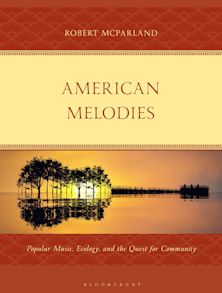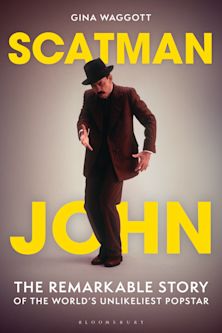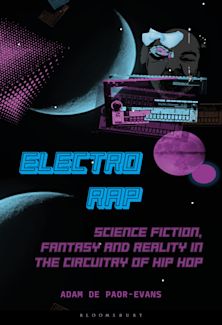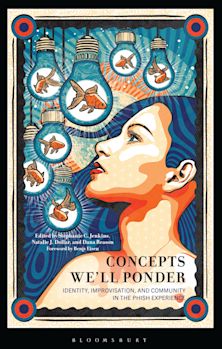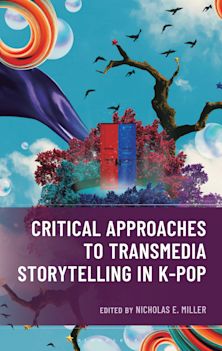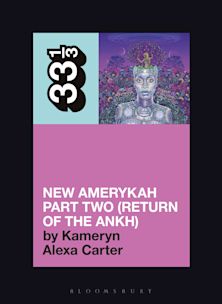- Home
- ACADEMIC
- Music & Sound Studies
- Popular Music
- Popular Music in the Post-Digital Age
Popular Music in the Post-Digital Age
Politics, Economy, Culture and Technology
Popular Music in the Post-Digital Age
Politics, Economy, Culture and Technology
You must sign in to add this item to your wishlist. Please sign in or create an account
Description
Popular Music in the Post-Digital Age explores the relationship between macro environmental factors, such as politics, economics, culture and technology, captured by terms such as 'post-digital' and 'post-internet'. It also discusses the creation, monetisation and consumption of music and what changes in the music industry can tell us about wider shifts in economy and culture. This collection of 13 case studies covers issues such as curation algorithms, blockchain, careers of mainstream and independent musicians, festivals and clubs-to inform greater understanding and better navigation of the popular music landscape within a global context.
Table of Contents
Introduction: The Future of and through Music
Ewa Mazierska, Les Gillon and Tony Rigg
Part 1: Music Industry
1. Rethinking Independence: What Does 'Independent Record Label' Mean Today?
Patryk Galuszka and Katarzyna M. Wyrzykowska, University of Lodz, Poland
2. The Future of Digital Music Infrastructures: Expectations and Promises of the Blockchain 'Revolution'
Paolo Magaudda, University of Padua
3. 'The Sound of the Future is Here Today': The Market for Post-Rock Within the Traditional Small Music Festival Landscape
Kenneth Forbes, University of the West of Scotland, UK
4. 'They Sold the Festival Out!': Axionormativity as the Future of Festivals
Waldemar Kuligowski, Adam Mickiewicz University, Poland
5. The Hidden Worker Bees: Advanced Neoliberalism and Manchester's Underground Club Scene
Kamila Rymajdo, Kingston University, UK
Part 2: Musicians and Their Music
6. The Adaptive Musician: The Case of Peter Hook and Graham Massey
Ewa Mazierska and Tony Rigg, University of Central Lancashire, UK
7. Where Do We Go From Here?: The Future of Composers in the Post-Digital Era
Lars Bröndum, University of Skövde, Sweden
8. Searching for International Success in Europe's Periphery: The Case of Gin Ga and Fran Palermo
Ewa Mazierska, University of Central Lancashire, UK
9. Electro Swing: The Re-Introduction of the Sounds of the Past into the Music of the Future
Chris Inglis, University of South Wales, UK
Part 3: Music Consumption
10. Back to the Future: Proposing a Heuristic for Predicting the Future of Recorded Music Use
Mathew Flynn, University of Liverpool, UK
11. Young People's Current Music and Media Use in Austria: The Musical Practice of the Future?
Michael Huber, University of Vienna, Austria
12. Curators as Taste Entrepreneurs in the Digital Music Industries
Emilia Barna, Budapest University of Technology and Economics, Hungary
13. An Echoic Chamber: Algorithmic Curation and Personalised Listening
Andrew Fry, Sounds et al, USA
Index
Product details

| Published | 13 Dec 2018 |
|---|---|
| Format | Ebook (Epub & Mobi) |
| Edition | 1st |
| Extent | 304 |
| ISBN | 9781501338380 |
| Imprint | Bloomsbury Academic |
| Publisher | Bloomsbury Publishing |
About the contributors
Reviews
-
[This book] does work of interest to historians of technology, 'thinking across' categories of technology, society, and culture, and dwelling on the historical specificity of each.
Technology and Culture
-
A timely addition to music and cultural scholarship because it raises a multitude of important questions concerning ways in which a highly marketized and commodified popular music industry might just be able to find its way through the neoliberal fog.
Leonardo Reviews
-
Barna and Magaudda provide two good examples of how, by following the actors themselves as they envision a future for music, grope and sketch the contours of the worlds to come, it is possible to think about them in an original way.
Volume! The French Journal of Popular Music Studies
-
Music industry is in a condition of permanent flux driven by music's seamless adaptation to digital innovation. The key tension in music industry as a practice is that digital application does not always chime with regulated ownership of intellectual property rights in music. This is an impressive collection in which all participants have worked in a focused way to specify how music industry is transformed by digitization. In a turbulent environment, this collection exhibits staying power and will be a useful point of reference for academics and students over a prolonged period.
Michael Jones, Senior Lecturer in Music, University of Liverpool, UK, and author of The Music Industries: From Conception to Consumption (2012)
-
In an era of ever-expanding technological possibility and pace, time is an invaluable and irreplaceable resource. As such, how we listen and to what we listen becomes a nuanced and important question about how we understand each other and our relationship to the places we live. Popular Music in the Post-Digital Age provocatively explores this from multiple perspectives and ideas, asking critical questions about the continued evolution and role of one of humankind's most expressive and important languages – the language of music.
Burke Jam, Sound Artist, Composer, and Director of Digital Facilities at Portland State University, USA
-
This is an important contribution to the growing literature on the present era of music, its practitioners and consumers, not least because of the international breadth of its coverage.
Dave Laing, Research Fellow, Institute of Popular Music, University of Liverpool, UK

ONLINE RESOURCES
Bloomsbury Collections
This book is available on Bloomsbury Collections where your library has access.














